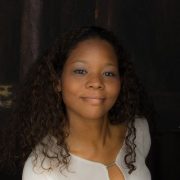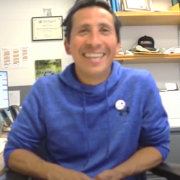Informational Interview with Professor Elliot Meyerowitz, Caltech
Informational Interview by Susana Perez Martine, ASPB Conviron Scholar 2020
I interviewed Dr. Elliot Meyerowitz who is the George Beadle Professor of Biology, and a Howard Hughes Medical Investigator at the California Institute of Technology, where he has been on the faculty since 1980.
Prior to joining the Caltech faculty he obtained an undergraduate degree in Biology from Columbia University, and graduate degrees in Biology from Yale University, following which he was a postdoctoral fellow at the Stanford University School of Medicine. From 2000 to 2010 he was Chair of the Caltech Division of Biology. In 2011 and 2012, while on leave from Caltech, he served as the Inaugural Director of the Sainsbury Laboratory at the University of Cambridge.
The Meyerowitz laboratory studies the development of Arabidopsis thaliana, a widely used plant model system that his laboratory (and others) popularized beginning in the early 1980s. After establishing molecular cloning for this plant, they identified and cloned numerous flower development genes, leading to the “ABC Model” of floral organ specification. They also cloned the receptors for the plant hormone ethylene, the first cloned plant hormone receptors, and identified the plant peptide hormone signaling system. Current studies concentrate on the role of mechanical signaling in plant development, and on the interactions between the peptide signaling system and hormone action in plant stem cells at the shoot apex.
Throughout this work, the Meyerowitz laboratory and a group of international collaborators has developed what they term “Computational Morphodynamics,” a combined experimental and computational approach to generation and testing of explicit hypotheses for plant development. The experimental side involves high-resolution live imaging of plant tissues as they grow and develop, with fluorescent reporters for gene activity and protein localization as well as for cellular components; the computational side involves the generation of sets of ordinary differential equations whose parameters represent properties of the plant that are amenable to experimental tests, and that reproduce the activities of the living plant at several different scales. This approach has led to the understanding of the mechanism by which plants create phyllotactic and other previously mysterious developmental patterns, as well as to the recognition of novel mechanisms for developmental pattern formation.
Among Meyerowitz’s honors are the Genetics Society of America Medal (1996); the International Prize for Biology of the Japan Society for the Promotion of Science (1997); the Lounsbery Award of the National Academy of Sciences (1999); the R.G. Harrison Prize of the International Society of Developmental Biologists (2005); the Balzan Prize (2006), the Sibthorp Medal of the University Oxford (2011), the Dawson Prize for Genetics from the University of Dublin (2013) and the Gruber Genetics Prize (2018). He has received honorary doctorates from the École Normale Supérieure de Lyon and Yale University. Meyerowitz is past president of the Genetics Society of America, the International Society for Plant Molecular Biology, and the Society for Developmental Biology. He is a member of the National Academy of Sciences, the American Academy of Arts and Sciences, and the American Philosophical Society, and is a foreign associate of the Académie des Sciences of France, and a foreign member of the Royal Society
What is your job?
Dr. Elliot Meyerowitz is a professor of biology at the California Institute of Technology, and an Investigator of the Howard Hughes Medical Institute.
What does your job involve?
Dr. Meyerowitz’s job involves a combination of research, teaching, public service, and mentoring.
The research aspect of his job:
Dr. Meyerowitz manages a research group of students and postdocs, with a lab manager as well, a total usually of around ten people. He also supervises the research in the lab, obtain funding for their research by applying for grants from federal and private foundation sources, manage the lab finances (including research expenses and salaries), hold several hours a week of group meeting to keep tabs on the work of each person in the lab, in addition to having one-on-one meetings with each of them. Another important aspect of the research part of his job is publication of their research results. Dr. Meyerowitz along with his students and postdocs, write the manuscripts that they submit and they go through many discussions and revisions. A final aspect of the research part of his job is that he publicizes their work to others in their field and to the general public, by attending professional meetings – which takes him all over the world – and by producing on-line materials such as his lab web page and things such as his public iBiology lectures (which you can find in this link https://www.ibiology.org/plant-biology/phyllotaxis/ .)
The teaching aspect of his job:
Dr. Meyerowitz teaches what he is asked to teach by his Division Chair and by the Biology Curriculum Committee, at present he teaches Introduction to Biology to 160 undergraduates, a required course for all non-biology majors, which involves 30 hours of lecture in spring term, as well as recitation periods all 5 days of the week, and weekly meetings with my teaching assistants. He also teaches a required graduate course, Responsible Conduct of Research, to about 60 graduate students from the Biology and Chemistry Divisions each year. This one meets 2 hours a week for one term each year.
In addition, he participates in the wider scientific community by reviewing papers, advising societies and funding agencies, organizing professional meetings, and serving on local, national and international committees (for example serving on the Management Board of the Sainsbury Laboratory at Cambridge University, on the Scientific Advisory Committee of the Weizmann Institute in Israel, and chairing the Biology Department Review Committee at the National University of Singapore).
One additional and very important responsibility is to help each of the students and postdocs in his lab to move into the next phase of their career, and to succeed once they have established their own laboratory (or biotech company). This involves not only writing many letters of recommendation, but also advice long after people have left the lab, and making connections between his former students and postdocs to scientists who can help with their research.
What skills are needed? and What preparation was required to obtain the job?
The preparation required to obtain his job involved obtaining a Ph.D. and doing postdoctoral work, to establish his research interests and research skills. Dr. Meyerowitz stated that among the many skills needed are the ability to speak and write clearly, personnel management, knowing how to serve on and to run a committee effectively, ability to absorb scholarly research in multiple areas, and to create new research directions.
What skills have you developed since starting in this position?
Since starting in this position, he has developed the following skills: public speaking, personnel management and conflict resolution, grant writing, financial management, committee leadership.
What do you like about your job?
Dr. Meyerowitz likes to interact with the people in the lab and with his scientific colleagues. He also likes thinking about scientific problems and their solutions, and helping others solve interesting and important scientific problems.
What are some of the biggest challenges you face in your job/profession?
One of the biggest challenges Dr. Meyerowitz faces is keeping a lab funded, it requires much grant writing and coming up with many new ideas and arguments to persuade federal agencies and private foundations to fund them.
Another challenge for him is knowing when and how to say no to invitations for advisory work such as grant and paper reviews and to serve on advisory committees, and to speak at meetings. Dr. Meyerowitz first tendency is to say yes to all requests because he wants to be helpful, but realistically he can’t do all of the work if there isn’t time for it, and if he said yes to everything there would not be enough time to do a good job of it.








Leave a Reply
Want to join the discussion?Feel free to contribute!